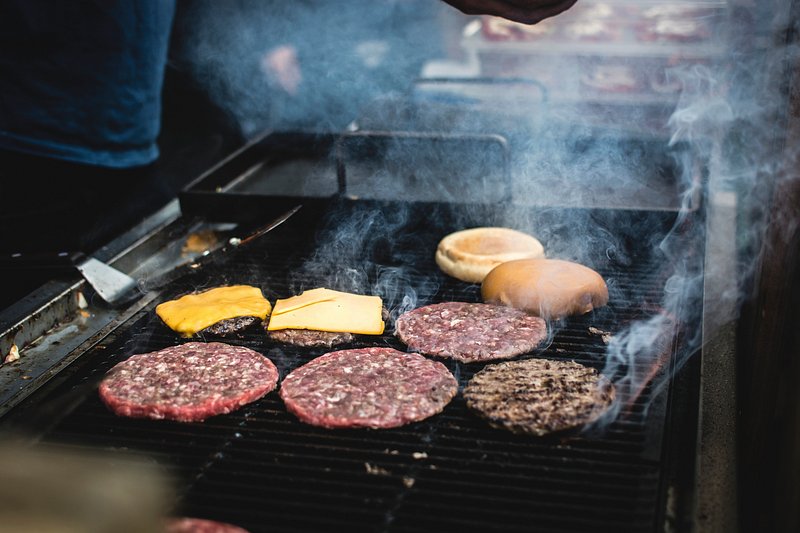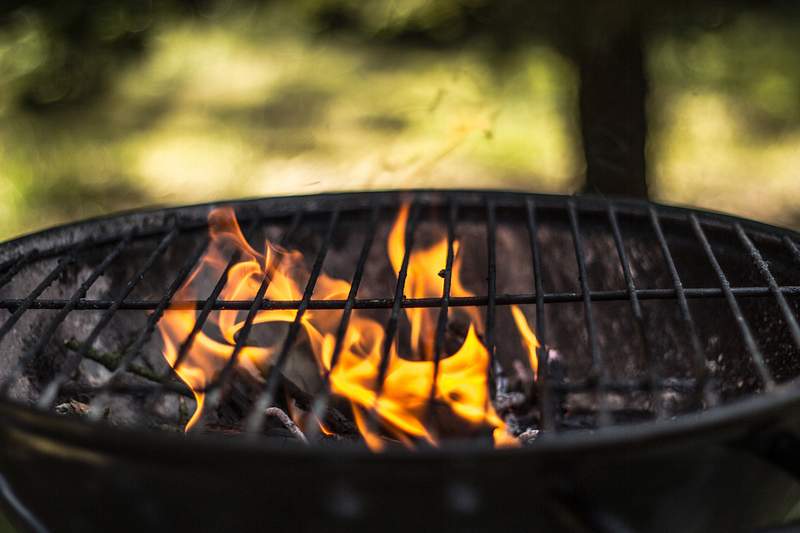It’s the time of year for cookouts and backyard BBQs, but grilling can sometimes be more trouble than it’s worth. From flaring flames to sticking meat, there are a many potential problems that can ruin a perfectly good grill session. Thankfully, most grilling problems can be avoided with a little bit of preparation.
In this guide, we’ve listed seven common grilling problems and how to solve them at home without any hassle.
Meats and Burgers Stick To the Grill

Foods stick to the grill when it is not cleaned before use. Therefore, cleaning the grill every time you use it to prepare a dish is essential. For example, meats and burgers stick to the burnt food particles on the grill and fall apart when the user turns them. Using a grill coated with stuck-on food is like cooking a dish in a dirty pan. The easiest solution to fix such grilling problems is to clean the grill before using it for grilling any food.
The oils and foods stick to the grill, which might be difficult to remove. The best way to do it is to heat the grill and then scrape it with a sharp scraper before using it for cooking. Then, with your tongs, take a few paper towels and dip them in cooking oil before running them over the hot grate. Make sure you wait until the fire dies down if you are using charcoal or turn off the gas if using the same for grilling.
The goal is to clean the grill before using it for grilling new foods. Your meats to grill, such as chicken, fish, pork, or burgers, will never stick if you keep your grill clean. Also, you should know how long to cook steak on grill or other foods to avoid burning and let them stick to the grill. Check out how to grill perfect chicken wings in this post.
Food Chars on the Outside Before It Is Fully Cooked.
Move most of your charcoal bricks to one end of the grill, or set one end of your gas grill on hot and the other on low to create a two-zone fire. Use the hot zone while grilling steak (and help keep the juice in), and then transfer it to the low heat zone to finish cooking completely without burning yourself.
Also, at the first sign of an outbreak, quickly move the food directly over the flame to the cooler area and wait for the fire to die out. Use a water bottle if needed, but it just throws ash on your food. It is best to let the flame go out naturally while transferring it to the low heat zone. You should know how long to grill steak or pork before grilling such foods. Check how to grill the perfect steak at home.
Finally, until the last few minutes of cooking, never apply barbecue, barbecue sauce, or other sauces that contain sugar or honey, and do so in the hot zone. If you apply it too early, the sugar will burn and give your food an unpleasant taste. Instead, always apply the sauces after you remove the foods from the grill in the last few seconds on the low heat zone. Alternatively, offer multiple sauces at the table and let your guests choose their favorites.
The Grill Does Not Turn On
Sometimes the grill won’t turn on, which can be a problem for many chefs as the order gets late until he cooks it on another grill. A grill not turning on can be a major problem for restaurant owners and hotels, especially if it is the primary grill used for grilling most foods. Whether it is battery-powered or has a push start button, it must be fixed immediately.
Battery-powered grills sometimes require a simple battery change. However, those with starting igniters that don’t produce an initial spark may mean the igniter is clogged, has a bad button, or the wiring needs repairing. And if the igniter is simply clogged, you can find it easily by removing the grill to check the burners. If the burners require cleaning, then clean them. If the problem appears to be with the buttons or wiring, you may need to contact a service technician to have those parts replaced.
Uneven Heating/Hot Spots

Uneven heating is one of the most common grilling problems. Blocked burners are the primary cause of uneven heating. Gas burners have holes or openings on the sides through which gas flows to create the flame. The drops often pass over the burner and clog the connections. Remove these deposits using a wired brush and a recommended cleaning solution to restore the flow of gas.
If the burners are completely clogged, cleaning them within the frame can be difficult. It is better to remove the burners and clean them in free space. Some grates allow you to simply lift off the burners, while others are screw-in and can be more difficult to remove.
If you can easily remove the burner from the grill, thoroughly clean the area with a stiff wire brush. Be sure to remove any debris from inside the burner. Do not use oven cleaners or strong detergents on your burners. These chemicals can further corrode the metal and shorten its lifespan.
Check out how to clean a gas grill using the right cleaning solutions.
Yellow Flame/ Orange Flame

On a gas grill, the color of the flame is usually blue with yellow tips. If you get yellow flames in the grill, it is a sign of improper gas/air mixture, or there may be bugs or a blockage in the burner. The air adjustment is made in the lower burner or if your burner uses venturi tubes, the adjustment depends on the tubes. If your gas grill produces a yellow or orange flame, you need to adjust the air damper as follows:
There should be a screw on the metal fastener at the end of the burner. You must loosen the screw to open or close the clasp (1/2 open for LPG and 1/4 open for line gas (natural gas).
Light the grill to see its blue flame pattern with yellow tips. Once the burners start producing blue flames, tighten the screw to secure the clasp.
No Gas Flow In The Grill
If you click your gas lighter, but your grill won’t light, you need to check the gas flow. Start by checking if there is gas in your tank. Many times we are not aware of the quantity of gas in the tank, and suddenly it runs out of gas. If you are using your grill in cold weather, the gas may solidify at the base of the tank, making it difficult to move up to the hose and burners. Moreover, the barbeque may use more fuel to maintain the same heating levels than it uses in the warm season.
Weigh your gas tank to check the quantity of gas in it. Most propane tanks weigh around 37 to 38 lbs when full, out of which 20 lb is the weight of the gas, while empty tanks weights about 17 to 18 lbs. installing a fuel level indicator is a good way to check the gas levels in your tank.
If case there is no gas leak, it is time to check the blocked venture hoses. Insects and rodents can reside on your grill in winter; Insects love these tubes, and they cause blockages in the pipes. Clean the grate burner tube with a recommended cleaning brush to check and remove clogs.
Black Smoke Grilling Problems
When your grill is producing a lot of smoke, especially black smoke, it usually means it’s time to clean it. A grill won’t produce black smoke until there is some food stuck on it. Excessive grease build-up on your grill contaminates your kitchen and leaves a toxic black film on your food. If black smoke is coming out through your grilling efforts, do a pre-clean and then preheat the grill for 15 minutes. This will help burn off the unwanted residue from previous use. If you’re still seeing that nasty black smoke after cleaning, check and clean your venturi tubes and dampers to ensure you’re producing the proper mixture of gas and air.
Also, you should not overcrowd your grill by cooking plenty of food at once. Try to keep a third of the cooking surface empty. Doing so will help you prevent flare-ups and reduce the chances of build-ups on the grill. If some foods like salmon or chicken flare up, move them to the non-flaming section of the grill to cook them without flame.
Summing Up
These were the seven grilling problems user commonly faces with grills. Regular maintenance and checkups are essential to determine such problems and fix them in time. Check your grill equipment and gas tank, and clean them regularly using the recommended products to keep the grills working properly. Well-maintained grills produce proper heat and cook the food evenly every time and also enhance the grilling life. Whenever a problem arises other than the regular cleaning, you can always look for professional help. Following the tips in this post can help you fix these common grill problems.
- The 9 Best BBQ Grills for Smoking Brisket - December 29, 2022
- 6 Mouth Watering Grilled Shrimp Recipes - September 16, 2022
- 6 Delicious Grilled Desserts - September 16, 2022

